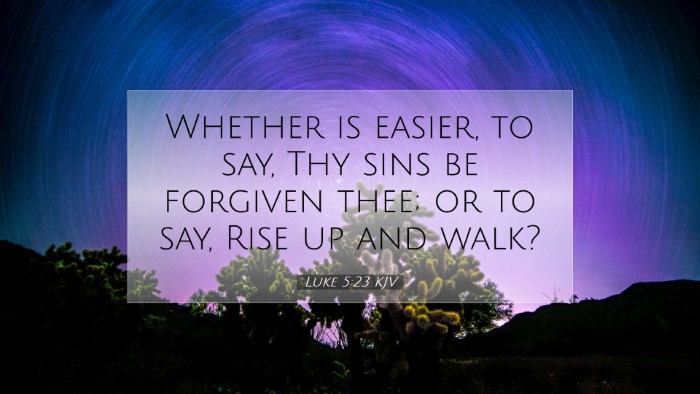Commentary on Luke 5:23
Verse: Luke 5:23 - "Whether is easier, to say, Thy sins be forgiven thee; or to say, Rise up and walk?"
Introduction
This verse is part of the broader narrative where Jesus heals a paralytic man who is brought to him by friends. Through this story, Luke emphasizes Jesus' authority to forgive sins and heal physical ailments, thereby revealing His divine nature. Significant insights from various public domain commentaries will be presented to underline the theological depth and practical implications of this verse.
The Authority of Jesus
Matthew Henry notes that this question posed by Jesus is pivotal; it strikes at the heart of the debate over His authority. Jesus presents a contrast between two statements: granting forgiveness of sins and healing a paralyzed man. Both acts showcase His divine power.
Albert Barnes elaborates that the Pharisees, present during this miracle, were aware of the implications of forgiving sins, which only God could do. This statement by Jesus serves to challenge their understanding of God's authority and His ability to forgive sin.
Comparison of Forgiveness and Healing
The question from Jesus reveals an inherent tension in human understanding about spiritual and physical restoration. Adam Clarke suggests that both are equally impossible for man but possible for God. Jesus uses this inquiry to prompt the bystanders to contemplate the nature of God's power and mercy.
Henry further expands on this comparison, emphasizing that while it may seem easier to declare one thing over another, the core truth remains that both require an immense act of divine will. The healing of the body and the forgiveness of sin carry equal weight in the eyes of God.
Theological Implications
- The Nature of Sin: The verse implies that sin is a significant barrier that requires divine intervention for forgiveness and healing.
- Jesus as the Mediator: Jesus positions Himself as the bridge between humanity and God, having the authority to clear the sin that separates them.
- The Response of Faith: Jesus highlights that the act of faith—believing in His capacity to forgive and heal—is a precondition for receiving these gifts.
Both Clarke and Barnes emphasize that true faith recognizes the dual necessity of spiritual and physical healing that Jesus offers. It is a holistic approach that Christians are called to embrace.
Pastoral Applications
For pastors, this verse is a powerful reminder of the nature of Jesus’ ministry, providing a model for preaching both forgiveness and healing. The active role that faith plays in the Christian life is reinforced here; both the congregation and the pastor can learn the importance of approaching Jesus with their needs, whether they are spiritual, emotional, or physical.
Henry advises leaders to model Christ's authority in their ministries, embodying His willingness to forgive and restore. It reinforces the church's mission to reflect God's love and mercy in a world crumbling under sin’s weight.
Conclusion
In summary, Luke 5:23 encapsulates key elements of the Gospel message: the authority of Jesus to forgive and heal, the holistic nature of salvation, and the importance of faith. By juxtaposing forgiveness with physical healing, Jesus invites us to understand that both aspects are critical in the journey of faith.
As biblical scholars reflect on this text, it serves as a foundation for understanding Christ's ministry and the Christian's response to sin, offering not just a historical insight but also a lived experience of redemption and restoration.


